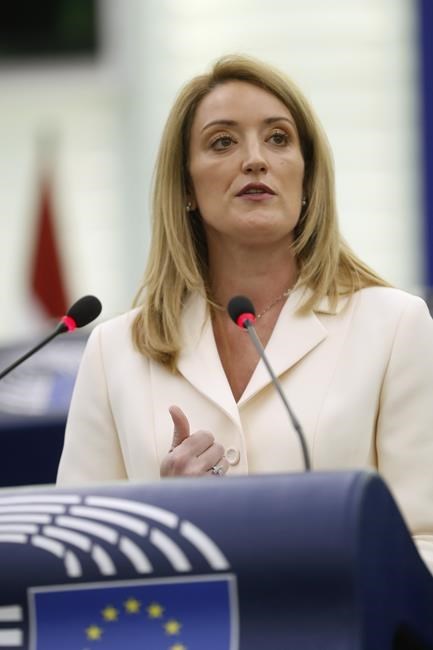BRUSSELS (AP) — Roberta Metsola, a Christian Democrat from Malta, was elected president of the European Union’s parliament Tuesday, putting women in three of the four biggest jobs in the 27-nation bloc.
Metsola succeeds Italian Socialist David Sassoli, who died last week. She is only the third woman elected to the post. Her birthday was Tuesday, and at age 43, she is the European Parliament’s youngest president.
Metsola was the candidate of the parliament’s biggest group, and she received 458 of the 616 votes cast Tuesday. She had already been acting president since Sassoli’s Jan. 11 death.
“I know that having the first female president of this house since 1999 matters both inside and outside these rooms, but it must go further,” Metsola told the plenary. “Our institution commits to having more diversity, gender equality, guaranteeing women’s rights, all our rights must be reaffirmed.”
EU Commission President Ursula von der Leyen could not attend the parliamentary session since she is in a COVID-19 quarantine. Another woman, Christine Lagarde, runs the powerful European Central Bank, which has vast sway over the EU economy.
The European Council, which represents the governments of the 27 member states, is lead by a man, Charles Michel, who as council president hosts the summits of the bloc's leaders.
The presidential election for the second half of the legislature had long been planned, but it became more poignant after the death of Sassoli, who had been sick for several months and decided not to seek another 2 1/2-year term.
Metsola will lead an EU institution which has become more powerful over the years and been instrumental in charting the course of the 27-nation bloc on issues such as the digital economy, climate change and Brexit.
Known as a committed bridge-builder between parties, Metsola said she would stick to Sassoli's style of work.
“David fought hard to bring people around the same table. It is that commitment to holding the constructive forces in Europe together that I will build on,” she said.
She referred to giants of European post-war politics like German Christian Democrat Helmut Kohl and French Socialist Francois Mitterrand to overcome party divisions and give her guidance.
“My appeal is to rediscover the purpose of Kohl and Mitterrand and leave behind the entrenchment of the past as we look to the future,” she said.
And reflecting on the European Parliament's last female president, France’s Nicole Fontaine, who presided from 1999 to 2002, Metsola vowed that “it will not be another two decades until the next woman is standing here.”
The European Parliament represents the EU’s 450 million citizens and refers to itself as “the heart of European democracy.” The parliament has long been the lesser EU institution compared to the executive European Commission and the European Council.
For many years, the parliament, which sits in Strasbourg, France, and Brussels was seen as a money-guzzling talking shop where politicians who had served their national purpose often were sent.
As it gained decision-making powers, though, the legislature it has become a more forceful player on the European scene. Metsola wants to continue that trend.
“We need to strengthen it. We cannot be afraid of reform,” she said. “The next part of the mandate will see a window of opportunity to make our parliament more modern, more effective and more efficient. We must seize the opportunity.”
Metsola is the first politician from Malta, a Mediterranean archipelago in the central Mediterranean with a population of just over half a million, to hold such a high position in the EU.
She has been an outspoken defender of Daphne Caruana Galizia, the Maltese investigative journalist who was killed in Malta in a 2017 car bombing.
As a member of the EU Parliament, Metsola has been a leader on migration issues. She is very progressive on women's rights and LGBT issues, but the mother of four boys has taken a conservative stance on abortion, reflecting her country's national politics.
She said Tuesday that she would staunchly defend the overall pro-abortion rights position of the legislature.
“I am a woman from a small island in the middle of Europe’s southern sea. I know what it means to be the underdog. I know what it means to be pigeonholed,” Metsola said. “I know what this means for every girl watching today. I know what it means for everyone who dares and whoever dared to dream.”
____
Lorne Cook contributed reporting.
Raf Casert, The Associated Press



